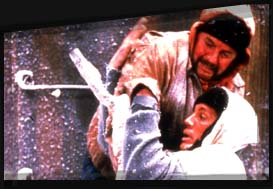Jon Voight stars as Manny, who is a lifer at a maximum-security prison in Alaska. We find out as the story opens that he has just won a court challenge to be released from solitary confinement into the general prison population. He has just spent the past 3 years with his cell welded shut, courtesy of Rankin, the prison’s sadistic Warden. The dynamic between these 2 men is established early, as Rankin delivers the news of his court win to Manny. “I hope you try something – I will send you out of here in PLASTIC!!” Manny, in fact, IS planning something – He immediately starts to work on breaking out, with the help of the slow-witted trustee Buck (Eric Roberts). Once out, the two have to make on a cross-country trek through brutal winter conditions, until they happen upon a remote train station. They jump on the titular train, and the film settles into its groove.
The two have unknowingly picked the worst possible train, as the conductor dies of a heart attack shortly after they start moving, and the locomotive starts to pick up speed. Here the film picks up a second plot thread as a railroad dispatcher office discovers the out of control train and begins to try to deal with it. Believing the train to be unmanned, the dispatchers make plans to de-rail it, and instruct an on-site switchman to switch it onto another track. However, in waiting for it to arrive at the switch, he hears the whistle blowing, and in a memorable scene holds his radio handset out the window for the office to hear. The switch is narrowly averted.
Manny and Buck are as surprised as we to hear the whistle, and this leads to the discovery of a third person on the train – A female railway worker. The girl is able to provide us with some valuable information – The train can be slowed down by unhooking the locomotives one at a time, but you can’t get from the second to the first engine because there are no handrails.

By this time, Rankin is in pursuit via helicopter, and we begin to see how the film parallels he and Manny. In surmising that Manny has jumped on a train, Rankin says with glee “He’s doing exactly what I would do.” Rankin finally catches up to the train and climbs down a rope ladder in order to board it. This sequence is simply spectacular, as the train hurtles through a snowy mountain pass, with the man hanging from the chopper above it. Manny has managed to get to leap to the front engine in the meantime, and it’s here where the final confrontation with Rankin takes place. The two men battle, and Rankin ends up handcuffed to the train. Rankin hurls insults at Manny, but it’s clear that Manny is now in a place where he can’t be touched.
“You’ll die , convict!”
“You’ll die with me”
“Fuck you! You’re as afraid to die as anyone else! And I never let you free”
“I’m free, Rankin…..I’m free”
I mentioned at the beginning of this piece that you will overlook a lot of stuff if a film grabs you by the cajones. “Runaway Train” is far from a perfect film. Rankin is painted as a bit too much of a cartoon sadist, and Eric Roberts’ Buck is best taken in small doses. If you look beyond those things, you see marvelous images and stuntwork, and a tour de force performance by Jon Voight. There is a quiet moment where Manny listens to Buck go on about what he’s going to do on the outside, then interrupts with a marvelous monologue about the reality about what their lives have become and how Buck will end up with some menial job. “And you will treat that job like gold, because it IS gold.” When Buck asks why Manny doesn’t do the same, Voights’ answer is simple, beautiful and wistful - “I wish I could.”
In a film chock full of memorable images, however there is one that stands out above all the rest, and that is the final one. A quote from Richard III appears onsceen as the train and its two occupants fly off to their ends. “No beast is so fierce but knows some touch of pity. But I know none, and therefore I am no beast.”
1 comment:
Runaway Train is one of the great action films. I've always been fascinated by that "based on a screenplay by Akira Kurosawa" credit. I wonder what exactly he wrote. Something tells me that my favorite speech in the film -- Voight's "if you clean that spot" monologue that you mention -- is the work of convict-turned-novelist Eddie Bunker.
Post a Comment